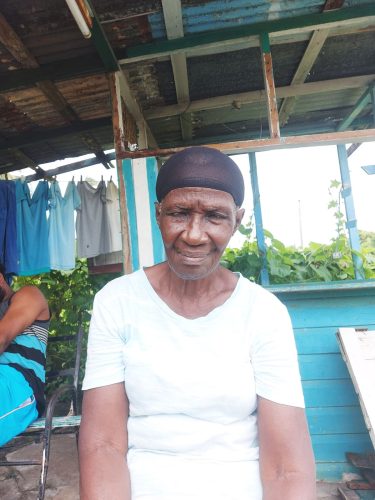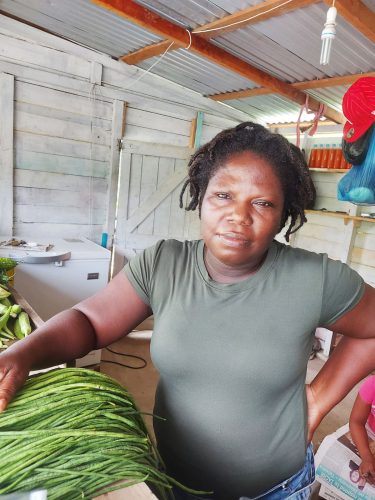Part 80
Stabroek News spoke to members of the public at Paradise, East Coast Demerara about the rising cost of living and how it is affecting them. The following are their comments:
Interviews and photos by Subhana Shiwmangal
Alton Griffith said: “The cost of living is affecting my family of four really bad because the prices for items have gone up in the markets/shops. Normally when I go shop, I will see a particular item cost $120, then in two weeks’ that item will suddenly rise to $160/$180/$200. When you have to pay rent and other expenses, the cost of living is very terrible and horrible for us. We find oil the other day and now we still have to go through all of this. But, the prices for food items keep going up and prices are not coming down. The government is not doing anything about this. So, I want to know if the government does not care about the small people? Down to my rent is going up. My family and I try to cope with the cost of living. My brother and I work to provide for the home. Sometimes although we budget, we still don’t get to buy everything we need for the home because the prices for everything keeps going up. The prices for rice, sugar, oil; everything gone up. For example, a 3 litre bottle oil a couple months back cost $1,200; now the oil cost $1,800. I think you just have to cope with the cost of living despite prices for items going up every day.”
Quinesha Punch said: “The cost of living is affecting me really bad because the prices for items are high and my family and I don’t get to buy what we want. I don’t work, I live with my mother who is self-employed while my elder sister works outside the home. Sometimes we don’t have enough money to buy grocery items and will have to borrow money from other family members to cope with the cost of living. I’m a family of nine. For example, a 1 litre bottle oil before cost $300 and something; now the oil cost $500 and something. Also, a cut of pumpkin a couple months back cost $200 and something; now a cut of pumpkin cost $300 and something. We just have to cope with the cost of living.”
Mark Stuart, a 37-year-old construction worker said: “The cost of living is affecting me a lot because people’s basic salary needs to increase countrywide. I’m the only person working in the home, I’m a construction worker. We should be able to afford to buy food, we can always buy clothes because the prices for clothes is cheaper than food right now. It doesn’t make sense I work for a basic salary now because when I go to the shop, it’s like $40,000 I’m spending to buy groceries for the week. Then I have to pay rent. My family of four, inclusive of my wife and two children have our own kitchen garden to help us with the greens but we still feel the high prices when purchasing other grocery items. Every week the price for something going up at the shop. For example, a pack consisting of 25 pampers before cost $1,100; now the pampers cost $1,400. A 10 lbs cylinder cooking gas a few months ago cost $4,400; now the gas cost $4,600. The government don’t need to give household any money but the government need to raise people’s basic salary more.”
Clyde Hilton, a 47-year-old construction worker said: “The cost of living is very hard right now because I’m not getting any work while people’s salary is not increasing and our country producing oil. I also have to pay rent. I live alone and would sometimes get support from my mother to cope with the cost of living. I also have my own kitchen garden where I try to cope with the cost of living. For example, a couple months back, a 10 kg Karibee rice cost $1,500; now the rice cost $2,200. A small pack Demerara Gold sugar before cost $400; now the sugar cost $560. I think the government should increase people’s salary and open a factory to create more jobs for the youths that are stealing from persons whilst on the road.”
Joan Joseph, a pensioner said: “The cost of living is very high and when I receive my monthly pension, I have to pay internet bill and other expenses then I have to hustle to buy groceries. When I finished paying the expenses, I don’t have any money left back to save. I’m a family of four, including my husband and two sons. My husband receives his pension as well. The prices for rice and sugar gone up in the market. For example, a couple months back, 10 kg bag Karibee rice cost $1,500; now the rice cost $2,200. The cost for potatoes is high right now and the quality is poor; most of my potatoes I purchase rotten. Before a pound of potatoes cost $100; now a pound of potatoes cost $300. Even the cost for celery has increased in the market. I think the government should consider raising the pension.”
Rachael Thom, a 63-year-old farmer/vendor said: “The cost of living is high but I try to cope with it by planting vegetables and fruits and sell to the community. Right now I’m reaping bora, boulanger, plantains, ochro, celery and tomatoes. I live alone. When I go to the shop/market to buy other grocery items, the prices are high; the cost of living is high. For example, a 10 kg Karibee rice before cost $1,500; now the rice cost $1,800. A couple months back a 3 litre bottle oil cost $2,000; now the oil cost $2,300. Right now, I want to build a fence around my yard to keep out the animals but I don’t have enough money but I’m still trying with whatever money I have. I think if everyone plants their own kitchen garden the cost of living will not affect them much.”
Ulrice Wilson, a NIS pensioner said: “The NIS pension that I receive monthly barely do to buy grocery items for me after I finished paying my utility bills. I try to do some repairs to people’s appliances at the side in order to buy things I need. Sometimes, I credit food items from the shop to make ends meet. I don’t understand why the NIS pension comes so small. I started working at a young age and all my contributions is intact. I think the government should raise the NIS pension because it is very difficult for someone to live on their NIS pension when the cost of living is so high. It is insufficient to support me. For example, before a gallon brown rice cost $500; now the rice cost $800 and something. A pound of chicken a couple months back cost $360/$400; now a pound of chicken cost $500. The government should place price control on all items and consider increasing NIS pension.”
Esse Peters, a 52-year-old security officer said: “The cost of living is terrible since this government take over. The cost of living is affecting me in relation to transportation cost. Even the cost for greens expensive. I’m not getting proper land space to plant like how I used to get under the previous government. We need to have a proper NDC in the area because the NDC I think is one sided. I’m a family of 15 persons and together we have a kitchen garden to cope with the cost of living. Only myself, my wife and elder daughter work to support the family. I believe before this government take over, certain items were sold cheaper in the market. My light and water bill use to come up to date; now it’s not. I used to get through faster at the Guyana Revenue Authority. The Bureau of Standard used to check how the people sold their items in the shop and so before, but now we don’t have that. When the community do a little fish fry/barbecue to have renovation done to the Paradise/Bachelor’s Adventure Community Centre Sports Club ground, nothing much comes out of the sale; it looks like everything is political. If we get this ground functioning a lot of youths will keep away from crimes. I personally went and visit the minister to have the ground functioning but nothing came out of it. I used to buy the Turbo energy drink for $160; now the drink cost $300. A 10 kg Karibee rice before cost $1,340/1,740; now the rice cost $2,000. I think the government should give business people concession and not just a few business people. Also, the Bureau of Standard have to do their duty to check how the people are selling their items in the markets/shops and the government should provide more land space for people to do agriculture.”
Bibi Amin, a 39-year-old vendor said: “The cost of living is affecting everyone. I don’t get enough money to buy food items because the prices for items are costly now in the shop/markets. My family and I try to make ends meet by budgeting.
I also run a vegetable stall while my husband work and support us in order to cope with the cost of living. I’m a family of four, including my two children. For example, a few months ago a pound of plantains cost $100; now a pound of plantains cost $200 and something.
A pound of pumpkin cost $60/$40 before; now a pound of pumpkin cost $120. I think the government should place price control on food items because people are selling their items at all kind of prices in the market.”
Horace Lholder, a 41-year-old farmer said: “Right now I’m doing two work to make ends meet in order to help with the high cost of living. I have a kitchen garden and I sell the produce to retailers/vendors and do part-time construction work sometimes. Right now, the rain is too much so things like the celery dying but I’m trying with other vegetables I have in the garden. Celery a couple months ago cost $3,500/ $4,000 wholesale; now celery cost $1,500 wholesale. It is still high because before a pound of celery was cheaper. The prices for other grocery items from the markets/shops are costly now. I have expenses such as, covering the cost for my daughter’s monthly fees, adding to that I have other expenses to cover. So, the cost for everything has gone up. Sometimes I get like a $10,000 from the construction work, it depends on how I get the work. Things rough right now but I try to cope with it; I try not to cry out. For example, a pound for sweet peppers before cost $300; now a pound of sweet pepper cost $800. The cost for cooking gas all gone up. The government should do something about the high cost of living. Also, these young people should see if they can get agriculture lands and plant more to cope with the cost of living.”















